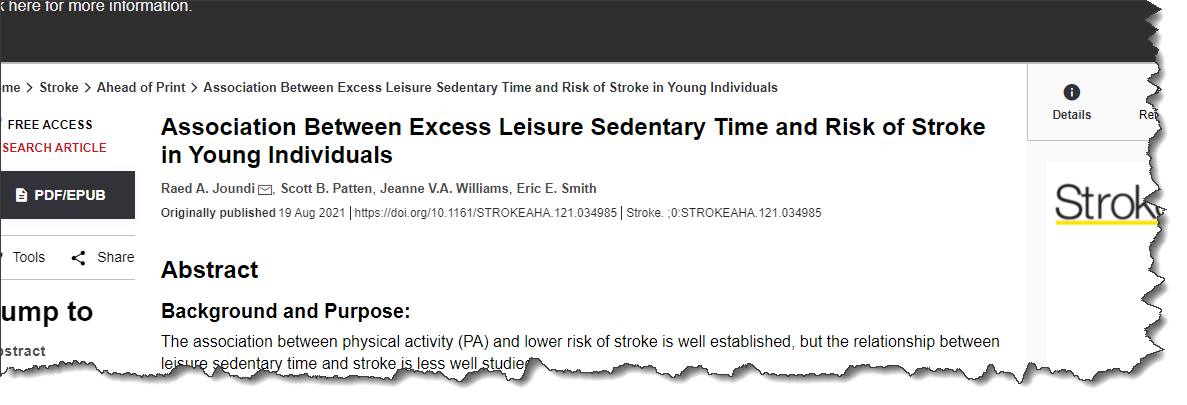
You’re probably doing it now without realizing it

Story-At-a-Glance
Matt Cook here, and one of my biggest health fears is suffering a stroke.
Because strokes can be so devastating mentally and physically.
And they can drastically cut lifespan short if you don’t take the right precautions.
Fortunately, I’ve discovered one simple potentially life-saving tip that can help you avoid strokes…
Check this out and share it with a friend!
—-Important Message—-
THIS is the #1 trigger for heart attack and stroke in men

Stunning breakthrough study out of The American College of Cardiology…
They have uncovered a “hidden landmine” that can lead to a heart attack or stroke in men…
…and it has to do with blood flow…
So I’ve been researching 5 unique nutrients that can help naturally reduce your risk of stroke and heart attack.
Here’s how to use these 5 nutrients to disarm the hidden landmine leading to heart attack and stroke — can potentially add decades to your life
———-
Doing this every day gives you a 7x greater risk of stroke
One of the scariest things that could happen to my health is having a stroke.
If they don’t kill you, they can leave you with permanent brain damage and disability.
Strokes are bad news.
But the incidence of strokes is also gradually creeping up – even in younger populations.
However, death from stroke appears to be on the rise among younger adults, ages 35 to 64 years — increasing from 14.7 in every 100,000 adults in 2010 to 15.4 per 100,000 in 2016.
That’s scary to me, so I’m always on the lookout for good science that will help me lower the risk of having a stroke.

This study was published by the American Heart Association and it’s pretty scary – especially if you sit during most of your free time.
The best news out of this study is that about 9 out of 10 strokes are completely preventable.
Which means you can dramatically lower your risks if you want to.
Previous research suggests the more time adults spend sedentary, the greater their risk of cardiovascular disease including stroke, and nearly 9 in 10 strokes could be attributed to modifiable risk factors such as sedentary behaviors.
What they looked at in this study is “leisure sedentary time.”
This is time spent sitting on your butt or laying down when not at work.
Sedentary time is the duration of awake activities that are done sitting or lying down. Leisure sedentary time is specific to the sedentary activities done while not at work.
This was a BIG study, and the researchers looked at how much time over 143,000 adults spent in leisure sedentary activities per day.
They reviewed the amount of time spent each day in leisure sedentary activities (hours spent on computer, reading and watching TV) and divided them into categories of less than four hours per day; four to less than six hours per day; six to less than eight hours per day; and eight hours or more a day.
What the researchers found was that the MORE time you spend sitting and/or lying down during your leisure hours…
The more likely you are to have a stroke.
In fact, if a person spent eight or more hours of their leisure time sitting or lying down they had a 4.2x increase in the rate of strokes.
That’s a HUGE increase!
Adults 60 years and younger who had low physical activity and reported eight or more hours of leisure sedentary time a day had a 4.2 times higher risk of stroke compared to those reporting less than four hours of daily leisure sedentary time.
For those that had low physical activity and lots of sedentary time, the results got even WORSE, with a 7x greater risk of a stroke.
The most inactive group — those reporting eight or more hours of sedentary time and low physical activity — had 7 times higher risk of stroke compared to those reporting less than four hours of sedentary time a day and higher levels of physical activity.
Now, I’m not saying that you have to become a gym rat, but it’s a very good idea to build exercise into your daily life as much as possible.
Go for a walk, go for a hike or take some dance lessons.
Even parking further away from work can all really help you to become far more active in your life.
Personally, I walk around a lot when I’m on calls.
Any activity is better than no activity, and any activity can help you reduce your risk of a stroke.
It’s your health and your life, so it’s a good idea to take charge of it.
—-Important Message for Men Who Want Decades of Happy, Healthy Life—-
What is their secret? These men in their 100s drink, smoke, and have sex like they’re 25…

I’ve found a hidden group of men in the Eastern Bloc who are living well past 100, even 115 and 120… AND having great sex.
Not just good sex, GREAT sex. As if they are men in their prime, in their 20s and 30s!
And I’ve identified one single thing these older men are doing (that I am now doing myself) that leads to a very long and sexy life.
Keep in mind, these men routinely smoke cigarettes, drink alcohol, and eat what they want.
———-

